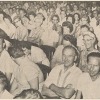2023 Eric Fry Labour History Research Grant

The ANU Australian Studies Institute (AuSI) is delighted to announce Katie Wood from La Trobe University as the 2023 Eric Fry Labour History Research Grant recipient. Her research project focusses on the ‘History of Women in the Australian Metal Trades 1888 – 1951’.
Established in 2004, the Eric Fry Labour History Research Grant provides an opportunity for students undertaking an honours or postgraduate thesis on a labour or social history related theme, to research at the Noel Butlin Archives Centre based at The Australian National University (ANU). AuSI is proud to sponsor the grant alongside The Canberra Region Branch of the Australian Society for the Study of Labour History (ASSLH).
“I’d like to warmly congratulate Katie on behalf of the AuSI team and wish her well throughout her research on the history of women in the Australian metal trades from 1888 to 1951. As Australia’s premier trade union archive, the Noel Butlin Archives Centre is the perfect place to research records from dozens of historically important unions inclusive of the Australian metal trades.”
- Professor Paul Pickering, Director, ANU Australian Studies Institute
More on Katie’s research project:
Can you tell us more about your Research project ‘History of Women in the Australian Metal Trades 1888 – 1951’? What led you to research this project? What have you discovered in your research? What do you hope to produce from your research?
With such an incredible business and labour movement collection, it would be nearly impossible to undertake a PhD in Australian labour history without a visit to the Noel Butlin Archive. That’s certainly the case for my PhD, and I have been using the huge collections from the metal unions already. There is still far more to explore, but living in Melbourne raising two small children means my research trips have to be as condensed and efficient as possible. The Eric Fry Research Grant will give me the opportunity to undertake my final research trip. This trip will be essential for the last few chapters focusing on the end of World War Two and the arguments around equal pay as the wartime changes to the metals workforce receded.
While researching the 1969 Clarrie O’Shea strikes for an exhibition at the University of Melbourne Archives I came across an image of a strike meeting at a manufacturing works in rural NSW. The image shows hundreds of workers, with a group of women sitting prominently in the middle. Although I’d read a lot about the militancy of the metal unions in the 1960s-70s, that image made me realise I’d just assumed these battles had been fought by men. It sparked an interest in the history of women in the metal trades and I was lucky enough to receive a scholarship from La Trobe University in support of an ARC project looking at the history of women in male-dominated industries, overseen by Dr Emma Robertson and Professor Diane Kirkby. I’ve been surprised by the prevalence of women in the metal trades from an early period and the lack of research on that history. For instance, I’ve discovered female ammunition workers from the 1880s organising themselves into a union. I hope that my finished thesis will reveal the drivers leading to the introduction of women workers in the metal trades and the response from unions and workers, in order to further understand the dynamics of the gendered division of labour.
Can you comment on the records you have used for your research and any particular contributions to your research from the Noel Butlin Archives?
The numerous metal union collections have been wonderful resources, especially those deposits covering the Federated Ironworkers, Sheetmetal Workers, the Amalgamated Engineering Union and the Munitions Workers Federation. I’ve found the transcript and report of the 1927 Iron Trades Inquiry, helpfully indexed transcripts of numerous metal trades award hearings and sets of correspondence from women metal workers to the metal unions. These are all documents that are not available elsewhere.
The Eric Fry Labour History Research Grant honours the memory of Dr Eric Fry (1921-2007), an ANU historian and founding member of the ASSLH in 1961.
Previous recipients of the grant can be found here.









